Hong Kong's Beijing-backed government has revoked the passports of six democracy activists who have fled and continue to protest in exile.
The government points out in a statement that these individuals are "lawless, wanted criminals".
Among the six individuals are prominent figures in Hong Kong's broad and democracy-promoting protest movement. They are Nathan Law, Christopher Mung Siu-Tat, Finn Lau, Fok Ka-Chi, Choi Ming-Da, and Simon Cheng.
Nathan Law co-founded the pro-democracy party Demosisto, which played a major role in the large-scale protests that shook Hong Kong during the previous decade. The party was disbanded in connection with the Beijing-backed government introducing a strict so-called security law that has been used to crack down on critics and activists.
Finn Lau has been active as an activist in exile in the UK since 2020. He is the creator of the protest doctrine "Lam chau", which roughly translates to "if we burn, you burn too" and aims to get the world to isolate the financial hub of Hong Kong to punish China.
That's how Hong Kong's democracy movement continues to operate. In Hong Kong, it's completely impossible to arrange any protest now, said Lau to TT during a Stockholm visit in the spring of 2022.
Earlier this year, Hong Kong's government introduced its own law, giving the government even more powers, including the possibility of revoking passports.
In May, 14 democracy profiles were sentenced for violating the security law, and several of them risk life imprisonment.
Hong Kong was a British colony for 155 years, but in 1997, the city was handed over to China. Then it became a "special administrative region" with a high degree of autonomy. According to the agreement, Hong Kong was to remain relatively free for at least 50 years, according to the motto "one country, two systems". China has since broken its promise and step by step expanded its control.
The Chief Executive of Hong Kong is appointed by China's government in Beijing.
After China's communist government proposed a new system where it would get to sift through all candidates, the so-called Umbrella Protests erupted in 2014. Hundreds of thousands of people occupied the business district of Central and demanded free elections. The next major protest wave occurred in 2019.
In the summer of 2020, China introduced a tightened so-called security law for Hong Kong. It prohibits separatism, subversive activities, terrorism, and collusion with foreign or external parties that are perceived to threaten China's security. Many dissidents and journalists have been arrested and imprisoned under the law since its introduction.






